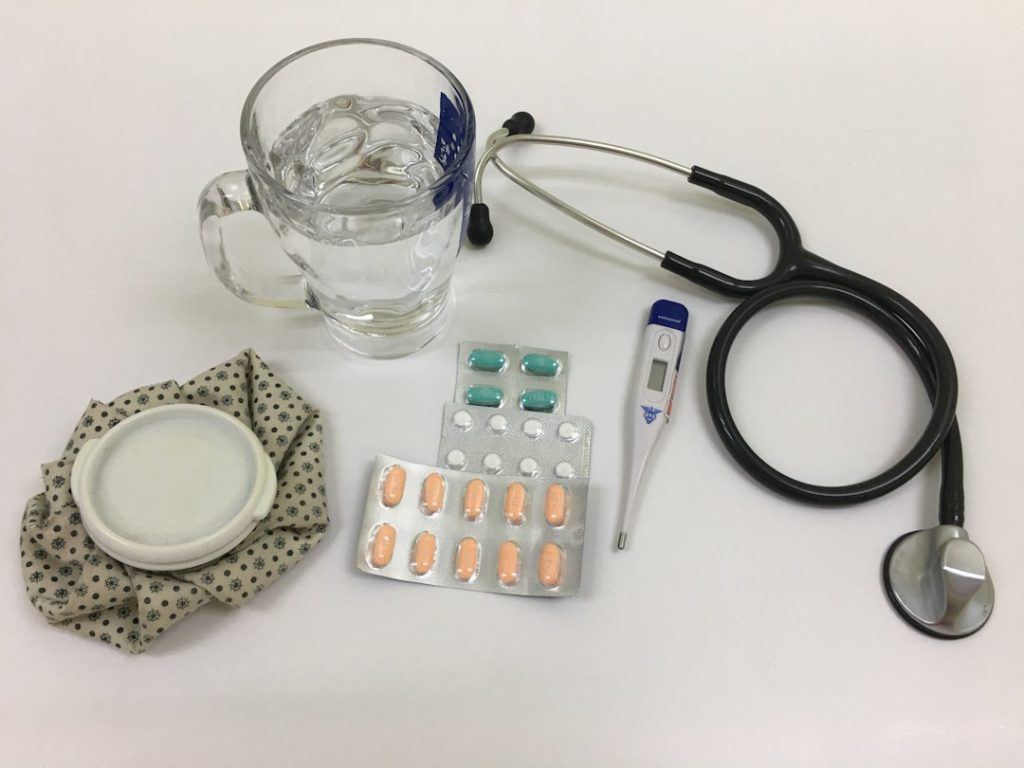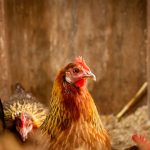Chickens are susceptible to various illnesses caused by bacterial infections, viral infections, parasitic infestations, nutritional deficiencies, and environmental stressors. Common bacterial infections include E. coli, Salmonella, and Mycoplasma, which can lead to respiratory issues, diarrhea, and reduced egg production.
Viral infections such as Newcastle disease, avian influenza, and infectious bronchitis can result in high mortality rates and significant economic losses. Parasitic infestations, including mites, lice, and worms, may cause irritation, anemia, and decreased egg production. Nutritional deficiencies in essential vitamins and minerals can weaken the immune system, impair growth, and affect reproduction.
Environmental stressors like extreme temperatures, poor ventilation, and overcrowding can also contribute to illness development in chickens. Understanding these common causes of chicken illnesses is essential for implementing effective preventative measures and maintaining flock health. By recognizing potential threats, chicken owners can take proactive steps to protect their birds and minimize the risk of illness.
Table of Contents
- 1 Implementing Proper Biosecurity Measures
- 2 Identifying and Addressing Nutritional Deficiencies
- 3 Preventing and Managing Parasitic Infections
- 4 Recognizing and Managing Common Viral Infections
- 5 Seeking Veterinary Assistance for Diagnosis and Treatment
- 6 Implementing Preventative Measures for Long-Term Chicken Health
- 7 FAQs
Key Takeaways
- Common causes of chicken illnesses include poor biosecurity measures, nutritional deficiencies, parasitic infections, and viral infections
- Proper biosecurity measures, such as controlling access to the flock and maintaining a clean environment, can help prevent the spread of diseases
- Nutritional deficiencies can be addressed by providing a balanced diet and access to clean water
- Parasitic infections can be prevented and managed through regular cleaning of the coop and administering appropriate medications
- Common viral infections in chickens include Newcastle disease and avian influenza, which can be managed through vaccination and isolation of sick birds
Implementing Proper Biosecurity Measures
Key Biosecurity Practices
Biosecurity measures include practices such as controlling access to the farm or coop, quarantining new birds before introducing them to the flock, maintaining clean and sanitized living conditions for the chickens, and controlling pests and wild birds that may carry diseases. It is also important to limit visitors to the farm or coop and to have designated clothing and footwear for anyone who comes into contact with the chickens.
The Importance of Good Hygiene
Practicing good hygiene by washing hands thoroughly before and after handling chickens can help prevent the spread of diseases. This simple yet effective practice can significantly reduce the risk of illness in the flock.
Reducing the Risk of Illness
By implementing proper biosecurity measures, chicken owners can reduce the risk of illness and maintain a healthy environment for their birds. This not only ensures the health and well-being of the chickens but also helps to prevent the economic losses associated with disease outbreaks.
Identifying and Addressing Nutritional Deficiencies

Nutritional deficiencies can have a significant impact on the health and well-being of chickens. Identifying and addressing these deficiencies is crucial for maintaining a healthy flock. Common nutritional deficiencies in chickens include lack of essential vitamins such as vitamin A, D, E, and B vitamins, as well as minerals such as calcium, phosphorus, and selenium.
Vitamin A deficiency can lead to respiratory issues and poor growth in chickens, while vitamin D deficiency can cause skeletal deformities and weak eggshells. Vitamin E deficiency can result in muscular dystrophy and reproductive issues in chickens. B vitamin deficiencies can lead to poor growth and neurological problems in chickens.
Calcium deficiency can cause weak or soft eggshells, while phosphorus deficiency can result in poor growth and skeletal issues. Selenium deficiency can lead to muscular dystrophy and reproductive problems in chickens. To address nutritional deficiencies in chickens, it is important to provide a well-balanced diet that includes a variety of grains, seeds, fruits, vegetables, and protein sources such as insects or mealworms.
Additionally, offering access to grit and oyster shell can help ensure that chickens are getting enough calcium and other essential minerals. Supplementing the diet with vitamin and mineral supplements may also be necessary to address specific deficiencies. Regularly monitoring the health and egg production of the flock can help identify any potential nutritional deficiencies early on so that they can be addressed promptly.
Nutritional deficiencies can have a significant impact on the health and well-being of chickens. Identifying and addressing these deficiencies is crucial for maintaining a healthy flock. Common nutritional deficiencies in chickens include lack of essential vitamins such as vitamin A, D, E, and B vitamins, as well as minerals such as calcium, phosphorus, and selenium.
Vitamin A deficiency can lead to respiratory issues and poor growth in chickens, while vitamin D deficiency can cause skeletal deformities and weak eggshells. Vitamin E deficiency can result in muscular dystrophy and reproductive issues in chickens. B vitamin deficiencies can lead to poor growth and neurological problems in chickens.
Calcium deficiency can cause weak or soft eggshells, while phosphorus deficiency can result in poor growth and skeletal issues. Selenium deficiency can lead to muscular dystrophy and reproductive problems in chickens. To address nutritional deficiencies in chickens, it is important to provide a well-balanced diet that includes a variety of grains, seeds, fruits, vegetables, and protein sources such as insects or mealworms.
Additionally, offering access to grit and oyster shell can help ensure that chickens are getting enough calcium and other essential minerals. Supplementing the diet with vitamin and mineral supplements may also be necessary to address specific deficiencies. Regularly monitoring the health and egg production of the flock can help identify any potential nutritional deficiencies early on so that they can be addressed promptly.
Preventing and Managing Parasitic Infections
Parasitic infections are a common threat to the health of a chicken flock. Preventing and managing parasitic infections is crucial for maintaining the well-being of the birds. Common parasites that affect chickens include mites, lice, fleas, ticks, roundworms, tapeworms, and coccidia.
These parasites can cause irritation, anemia, decreased egg production, weight loss, diarrhea, and even death in severe cases. Preventing parasitic infestations involves implementing proper biosecurity measures such as regularly cleaning and sanitizing the coop or living area, providing dust baths for the chickens to help control external parasites like mites and lice, and controlling wild birds or rodents that may introduce parasites to the flock. Managing parasitic infections may involve using parasiticides or dewormers that are safe for use in poultry.
It is important to follow the instructions carefully when using these products to ensure their effectiveness while minimizing any potential risks to the chickens or their eggs. Regularly monitoring the health of the flock for signs of parasitic infestations such as feather loss, pale combs or wattles, weight loss, or diarrhea can help identify any issues early on so that they can be addressed promptly. Parasitic infections are a common threat to the health of a chicken flock.
Preventing and managing parasitic infections is crucial for maintaining the well-being of the birds. Common parasites that affect chickens include mites, lice, fleas, ticks, roundworms, tapeworms, and coccidia. These parasites can cause irritation, anemia, decreased egg production, weight loss, diarrhea, and even death in severe cases.
Preventing parasitic infestations involves implementing proper biosecurity measures such as regularly cleaning and sanitizing the coop or living area, providing dust baths for the chickens to help control external parasites like mites and lice, and controlling wild birds or rodents that may introduce parasites to the flock. Managing parasitic infections may involve using parasiticides or dewormers that are safe for use in poultry. It is important to follow the instructions carefully when using these products to ensure their effectiveness while minimizing any potential risks to the chickens or their eggs.
Regularly monitoring the health of the flock for signs of parasitic infestations such as feather loss, pale combs or wattles, weight loss, or diarrhea can help identify any issues early on so that they can be addressed promptly.
Viral infections are a significant concern for chicken owners as they can have devastating effects on a flock if not properly managed. Recognizing and managing common viral infections is crucial for maintaining the health of chickens. Some common viral infections that affect chickens include Newcastle disease (ND), avian influenza (AI), infectious bronchitis (IB), Marek’s disease (MD), infectious laryngotracheitis (ILT), fowl pox (FP), and infectious bursal disease (IBD).
These viral infections can cause respiratory issues, decreased egg production, neurological problems, immune suppression, weight loss, and high mortality rates in severe cases. Preventing viral infections involves implementing proper biosecurity measures such as controlling access to the farm or coop to prevent exposure to wild birds or other potential carriers of viruses. Vaccination is also an important tool for preventing certain viral infections such as Newcastle disease or infectious bronchitis.
If a viral infection is suspected within a flock, it is important to seek veterinary assistance for diagnosis and treatment options. Managing viral infections may involve supportive care such as providing supplemental heat or fluids for sick birds as well as implementing strict quarantine measures to prevent further spread of the virus within the flock. Viral infections are a significant concern for chicken owners as they can have devastating effects on a flock if not properly managed.
Recognizing and managing common viral infections is crucial for maintaining the health of chickens. Some common viral infections that affect chickens include Newcastle disease (ND), avian influenza (AI), infectious bronchitis (IB), Marek’s disease (MD), infectious laryngotracheitis (ILT), fowl pox (FP), and infectious bursal disease (IBD). These viral infections can cause respiratory issues, decreased egg production, neurological problems, immune suppression, weight loss, and high mortality rates in severe cases.
Preventing viral infections involves implementing proper biosecurity measures such as controlling access to the farm or coop to prevent exposure to wild birds or other potential carriers of viruses. Vaccination is also an important tool for preventing certain viral infections such as Newcastle disease or infectious bronchitis. If a viral infection is suspected within a flock, it is important to seek veterinary assistance for diagnosis and treatment options.
Managing viral infections may involve supportive care such as providing supplemental heat or fluids for sick birds as well as implementing strict quarantine measures to prevent further spread of the virus within the flock.
Seeking Veterinary Assistance for Diagnosis and Treatment

Early Detection and Diagnosis
Veterinarians with experience in poultry health can provide valuable insight into identifying illnesses early on through regular health checks or diagnostic testing if necessary. If an illness is suspected within a flock but its cause is unclear or if multiple birds are affected at once with severe symptoms such as high mortality rates or neurological issues, it is important to seek veterinary assistance promptly.
Guidance on Treatment Options
Veterinarians can provide guidance on appropriate treatment options for specific illnesses affecting chickens while minimizing any potential risks associated with medication use or other interventions.
Preventative Measures
They may also offer advice on preventative measures such as vaccination programs or biosecurity protocols tailored to specific risks within a given area or farm setting.
Implementing Preventative Measures for Long-Term Chicken Health
Implementing preventative measures is crucial for maintaining long-term chicken health within a flock. This includes practices such as regular health checks for all birds within the flock to monitor their overall well-being including body condition score (BCS), comb coloration (indicative of blood oxygenation levels), weight gain/loss trends over time etc., implementing proper biosecurity measures such as controlling access to the farm or coop quarantining new birds before introducing them into an existing flock maintaining clean living conditions providing dust baths etc., addressing any potential nutritional deficiencies through balanced diet provision supplementation with vitamins/minerals etc., preventing managing parasitic infestations through regular cleaning/sanitization practices use of parasiticides/dewormers etc., recognizing managing common viral infections through vaccination programs strict quarantine measures seeking veterinary assistance when necessary etc., seeking veterinary assistance for diagnosis treatment when necessary etc., implementing preventative measures tailored specifically towards long-term chicken health within a given area/farm setting. By implementing these preventative measures consistently over time chicken owners can minimize potential risks associated with illness outbreaks maintain overall well-being within their flocks while maximizing productivity levels over time.
Implementing preventative measures is crucial for maintaining long-term chicken health within a flock. This includes practices such as regular health checks for all birds within the flock to monitor their overall well-being including body condition score (BCS), comb coloration (indicative of blood oxygenation levels), weight gain/loss trends over time etc., implementing proper biosecurity measures such as controlling access to the farm or coop quarantining new birds before introducing them into an
If you’re having trouble keeping your chickens healthy, you may want to consider the impact of their living conditions. According to a recent article on PoultryWizard, the design and cleanliness of your chicken coop can have a significant impact on the health and well-being of your flock. In fact, the article “Hannah Montana Chicken Coop” discusses the importance of providing a clean and comfortable living space for your chickens to prevent illness and disease. By investing in a high-quality coop like the “Snaplock Chicken Coop,” you can help ensure that your chickens stay healthy and happy. (source)
FAQs
What are common reasons why chickens keep getting sick?
Common reasons why chickens keep getting sick include poor sanitation, overcrowding, inadequate nutrition, and exposure to pathogens or parasites.
How can I prevent my chickens from getting sick?
To prevent chickens from getting sick, it is important to maintain a clean and dry living environment, provide a balanced diet, ensure proper ventilation, and regularly monitor for signs of illness. Additionally, practicing good biosecurity measures can help prevent the spread of diseases.
What are some common illnesses that affect chickens?
Common illnesses that affect chickens include respiratory infections, coccidiosis, Marek’s disease, infectious bronchitis, and avian influenza. Parasites such as mites and lice can also cause health issues in chickens.
What should I do if my chickens are showing signs of illness?
If your chickens are showing signs of illness, it is important to isolate the sick birds from the rest of the flock, provide supportive care such as warmth and hydration, and consult a veterinarian for proper diagnosis and treatment.
Can I use antibiotics to treat sick chickens?
The use of antibiotics in chickens should be done under the guidance of a veterinarian. It is important to use antibiotics responsibly and only when necessary to avoid the development of antibiotic resistance.
Meet Walter, the feathered-friend fanatic of Florida! Nestled in the sunshine state, Walter struts through life with his feathered companions, clucking his way to happiness. With a coop that’s fancier than a five-star hotel, he’s the Don Juan of the chicken world. When he’s not teaching his hens to do the cha-cha, you’ll find him in a heated debate with his prized rooster, Sir Clucks-a-Lot. Walter’s poultry passion is no yolk; he’s the sunny-side-up guy you never knew you needed in your flock of friends!







